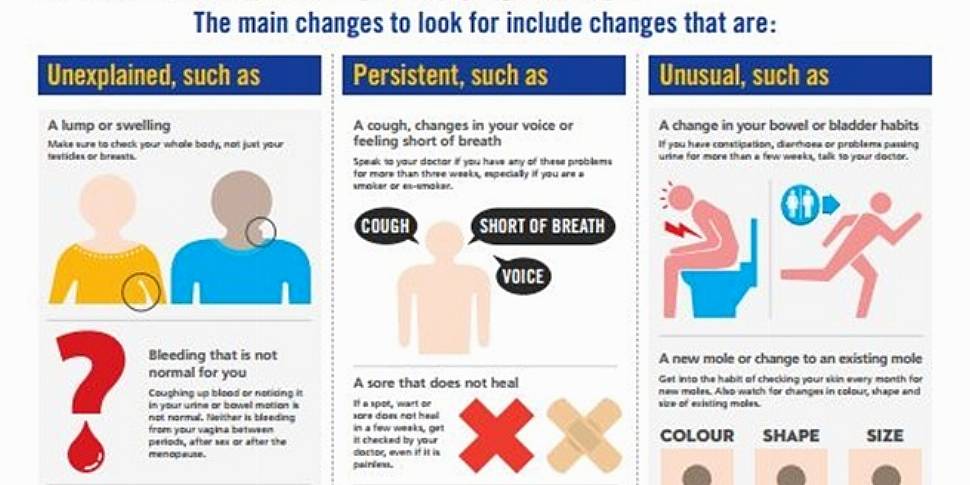It's World Cancer Day and we're being reminded to be aware of the early signs of the disease.
36,000 people are diagnosed with cancer in Ireland every year.
A report from the National Cancer Control Programme this week found demand on cancer treatment services will more than double here over the next 25 years.
The rising incidence and prevalence of cancer is being driven by Ireland’s ageing population and the success of long-term treatments in improving survival.
Here are three ways to reduce the risk of the illness, according to the Irish Cancer Society.
1. Quit Smoking
Half of all smokers die from smoking related diseases. Each year at least 5,200 people in Ireland die from diseases caused by tobacco use. This represents approximately 19% of all deaths.
The breakdown is as follows:
- Cancers - 44%
- Circulatory diseases - 30%
- Respiratory diseases - 25%
- Digestive diseases - 1%
Everyone knows you feel better when you give up smoking. But did you know that the health benefits kick in almost immediately and accumulate over time? Here’s a summary of what happens to your body when you quit (Data source: US Surgeon General’s Office):
- After 20 minutes: your blood pressure and pulse rate return to normal. Circulation improves in hands and feet.
- After 8 hours: oxygen levels in the blood return to normal and your chance of heart attack starts to fall.
- After 24 hours: poisonous carbon monoxide gas is eliminated from the body. The lungs start to clear out mucous and other debris.
- After 48 hours: nicotine is no longer detectable in the body. Taste and smell improve.
- After 72 hours: breathing becomes easier as the bronchial tubes relax and energy levels increase.
- After 2 weeks: circulation improves, making walking and exercise easier.
- After 3 to 9 months: coughing, shortness of breath and wheezing are reduced dramatically.
- After 5 years: risk of heart attack falls to that of a non-smoker.
- After 10 years: risk of lung cancer falls to about half that of a smoker.
- How to do it
The first thing is to realise that quitting smoking is a process and it is important to understand where you fit in the process or ‘cycle’ of change.
Next, you need to plan when and how you’re going to quit. If you manage to stay off smoking for a few weeks, your chances of success are greatly increased.
2. Healthy Lifestyle
Your diet has a powerful effect on your health, including your chance of getting cancer. You can reduce your risk of cancer by eating a healthy, balanced diet. This means that your diet is:
- Rich in fruit and vegetables
- High in ï¬bre
- Low in red and processed meat, saturated fat and salt
You can start to eat your way to good health at any time, from childhood to old age. No matter when you start, you will begin to be healthier. And eating your way to good health doesn’t just protect you against cancer and other diseases. It will also provide you with lots more energy and the key ingredients for looking and feeling great at any age.
The Irish Cancer Society recommends that the five fundamentals of healthy eating will set you on the right path to reducing your cancer risk and eating your way to good health. It is also important to remember that a healthy diet will help you to maintain a healthy body weight, which can itself reduce the risk of many cancers.
The five fundamentals of healthy eating are:
- Go bananas for fruit and veg
- Fill up on fibre
- Red alert on red and processed meat
- Think before you chew the fat
- Don’t take it with a pinch of salt
3. Spot cancer early
You are more likely to survive cancer if you spot it at an early stage. Take time today to check your body for changes that could be cancer. Talk to your doctor if you notice anything unusual for you.
For more information, you can visit the Irish Cancer Society website.










